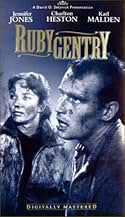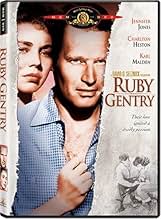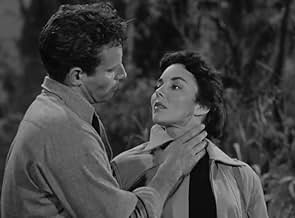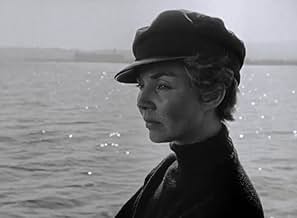AVALIAÇÃO DA IMDb
6,6/10
1,9 mil
SUA AVALIAÇÃO
Adicionar um enredo no seu idiomaA sexy but poor young girl marries a rich man she doesn't love, but carries a torch for another man.A sexy but poor young girl marries a rich man she doesn't love, but carries a torch for another man.A sexy but poor young girl marries a rich man she doesn't love, but carries a torch for another man.
- Direção
- Roteiristas
- Artistas
Barney Phillips
- Dr. Saul Manfred
- (as Bernard Phillips)
- …
Peter Adams
- Joage--Golfer
- (não creditado)
Edgar Dearing
- Engineer
- (não creditado)
George Fields
- Harmonica Player
- (não creditado)
Thomas Browne Henry
- Cotton Warehouse Owner
- (não creditado)
Selmer Jackson
- Club Member at Bar
- (não creditado)
- Direção
- Roteiristas
- Elenco e equipe completos
- Produção, bilheteria e muito mais no IMDbPro
Avaliações em destaque
Charlton Heston is at the height of his hunk stage and played an unusual type, against his rugged, frontier persona. Jennifer Jones is sultry and moody through several decades, backed by the haunting "Ruby" theme. Richard Hyman's harmonica is a perfect compliment to the two lead character types. I think it is even more effective in black and white than it could ever have been in color. Perhaps this element underscores the black and white social mores of the era. This movie is the first to really make me believe Jennifer Jones character is principally an emotionally grounded person, touchable by others. I usually find her too self contained to feel deeply. I have seen this movie several times, and thoroughly appreciate it each time.
7jhkp
Jennifer Jones is so big in this film she makes Charlton Heston appear to be underacting - no mean feat! Nonetheless she's a fascinating actress to watch, and the whole film is fresh. Does it seem like "real life" North Carolina? No, but I don't really think it matters. It's an effective, entertaining melodrama that was a big hit in its day.
Ruby Gentry was filmed on location (mostly in rural California), and what a nice, uncomplicated, outdoor feeling the film has. It's not studio-bound at all, even when the occasional use of process photography is obvious. Who could ever forget that amazing love scene played in the convertible careening down the beach, for example? You can almost feel the fresh sea air and smell the salt water. Heston and Jones, in this and other steamy scenes (at least for the time) make a surprisingly effective team.
Photographed in real light, Jennifer Jones looks just about five years too old for the part; she seems to compensate by overdoing the tomboy aspects, strutting about and speaking too loudly to people standing three feet away from her. Playing a tramp-ish character, a girl from the wrong side of the tracks, she's hardly as naturally sultry or sexy as, say, Ava Gardner. She works at it, and works a bit too hard, at times. A scene in which she pours coffee for a group of horny guys, where all she has to do is stand there looking good, is played with so many varied facial tics and expressions. She can't throw away a scene, or a moment.
Yet her performance is appropriate to the character and the film. She commands the screen and is never boring for a second. What's great about Jennifer Jones is her incredible sensitivity, so that when Ruby is slighted by the people of her town for her low social status, despite (and because of) her marriage to Karl Malden's wealthy character, her hurt and rage are palpable. She really lives the part. And this drives the film. She has a great deal of life on the screen.
Charlton Heston is great. Looser than usual, calling his girl, "baby." He doesn't seem to rely as much on his mellifluous voice this time. He plays a regular American guy. It's a shame he didn't get to demonstrate the casual quality of his Boake Teckman, here, in other roles. But I guess when you play Moses and Michelangelo you don't get that much of an opportunity.
Karl Malden was still pretty new to moviegoers at this time but he became very popular, very fast, after his Oscar winning role in Streetcar. In many ways he's always reminded me of Spencer Tracy with his sharp yet warm, human portrayals. Unfortunately he didn't have Tracy's good looks and wasn't in line for leading man parts. But that didn't stop him from becoming a top star. He blends into his part expertly and makes us forget he's acting. He just seems to be Jim Gentry.
The brilliant director King Vidor went through a long melodramatic period and it was most enjoyable. Ruby Gentry was a highlight.
The score (for harmonica and orchestra) is one of the most memorable things about the film, the theme music became a big hit called "Ruby."
Ruby Gentry was filmed on location (mostly in rural California), and what a nice, uncomplicated, outdoor feeling the film has. It's not studio-bound at all, even when the occasional use of process photography is obvious. Who could ever forget that amazing love scene played in the convertible careening down the beach, for example? You can almost feel the fresh sea air and smell the salt water. Heston and Jones, in this and other steamy scenes (at least for the time) make a surprisingly effective team.
Photographed in real light, Jennifer Jones looks just about five years too old for the part; she seems to compensate by overdoing the tomboy aspects, strutting about and speaking too loudly to people standing three feet away from her. Playing a tramp-ish character, a girl from the wrong side of the tracks, she's hardly as naturally sultry or sexy as, say, Ava Gardner. She works at it, and works a bit too hard, at times. A scene in which she pours coffee for a group of horny guys, where all she has to do is stand there looking good, is played with so many varied facial tics and expressions. She can't throw away a scene, or a moment.
Yet her performance is appropriate to the character and the film. She commands the screen and is never boring for a second. What's great about Jennifer Jones is her incredible sensitivity, so that when Ruby is slighted by the people of her town for her low social status, despite (and because of) her marriage to Karl Malden's wealthy character, her hurt and rage are palpable. She really lives the part. And this drives the film. She has a great deal of life on the screen.
Charlton Heston is great. Looser than usual, calling his girl, "baby." He doesn't seem to rely as much on his mellifluous voice this time. He plays a regular American guy. It's a shame he didn't get to demonstrate the casual quality of his Boake Teckman, here, in other roles. But I guess when you play Moses and Michelangelo you don't get that much of an opportunity.
Karl Malden was still pretty new to moviegoers at this time but he became very popular, very fast, after his Oscar winning role in Streetcar. In many ways he's always reminded me of Spencer Tracy with his sharp yet warm, human portrayals. Unfortunately he didn't have Tracy's good looks and wasn't in line for leading man parts. But that didn't stop him from becoming a top star. He blends into his part expertly and makes us forget he's acting. He just seems to be Jim Gentry.
The brilliant director King Vidor went through a long melodramatic period and it was most enjoyable. Ruby Gentry was a highlight.
The score (for harmonica and orchestra) is one of the most memorable things about the film, the theme music became a big hit called "Ruby."
This hormone driven drama should have provided fodder for a good prime time soap opera the way Joan Crawford's Flamingo Road was later turned into one for television. The characters and plot line are right up there with Dallas and Falcon Crest.
Jennifer Jones is driving all the men crazy here. First we have Charlton Heston who's the scion of the town's leading family. Good bloodlines, but a cash flow problem. He just wants a roll in the hay with her bad, but marry her and soil the family name, heaven forfend. Then we have Karl Malden, the town's richest man who stayed faithful to and invalid wife, but who also lusts for Jennifer and then marries her before the wife's body is cold. And we can't forget the Yankee doctor who comes to this North Carolina town and takes one look at Jennifer Jones in a tight blouse and he's hooked. Bernard Phillips who plays the doctor is the narrator and it's his eyes from which we see the action unfold. And we can't forget Jennifer's brother James Anderson, a wild religious fanatic who is constantly warning her about the wages of her sins, but there's more than a little hint of some incest he'd like to engage in.
Charlton Heston said in his memoirs that he enjoyed working with Jennifer Jones, Karl Malden and the rest of the cast, but David O. Selznick, Jen's husband and svengali was one royal pain.
The movie is trash, it don't pretend to be anything else, but it made a mint at the box office. If you liked Dallas, Falcon Crest, Dynasty, etc., you'll love Ruby Gentry.
Jennifer Jones is driving all the men crazy here. First we have Charlton Heston who's the scion of the town's leading family. Good bloodlines, but a cash flow problem. He just wants a roll in the hay with her bad, but marry her and soil the family name, heaven forfend. Then we have Karl Malden, the town's richest man who stayed faithful to and invalid wife, but who also lusts for Jennifer and then marries her before the wife's body is cold. And we can't forget the Yankee doctor who comes to this North Carolina town and takes one look at Jennifer Jones in a tight blouse and he's hooked. Bernard Phillips who plays the doctor is the narrator and it's his eyes from which we see the action unfold. And we can't forget Jennifer's brother James Anderson, a wild religious fanatic who is constantly warning her about the wages of her sins, but there's more than a little hint of some incest he'd like to engage in.
Charlton Heston said in his memoirs that he enjoyed working with Jennifer Jones, Karl Malden and the rest of the cast, but David O. Selznick, Jen's husband and svengali was one royal pain.
The movie is trash, it don't pretend to be anything else, but it made a mint at the box office. If you liked Dallas, Falcon Crest, Dynasty, etc., you'll love Ruby Gentry.
It's no big surprise that RUBY GENTRY receives such mixed reviews, because the theme of the film will not appeal to small-town America. Ruby is a girl from the wrong side of the tracks, as the narrator at the beginning of the film states. What this is code for in classic Hollywood is not necessarily straight translation. In other words, we are in the realm of a lost art form: the romantic film, or the melodrama. King Vidor was a master of this craft.
Ruby, then, was different. She was a free spirit, an unconventional thinker, and a seductive beauty. This is a lethal combination in the small, conservative town Ruby grows up in. She falls in love, of course, with the 'popular' boy, the rich kid, who the most well-bred society girls are after. Of course none of them have anything except their money against Ruby, and Boake (Charlton Heston) knows it! So there is an essential conflict between what Boake wants (Ruby) and what he is expected to have. He, unlike Ruby, is rather weak, and afraid. Deep down he loves her, but he lacks her spirit and wisdom. He won't go after someone looked down on by the town. He has to be 'respectable.' He cares what others think. Ruby does not, so she is willing to fight for him, but at the same time she does not want to be taken for granted. She wants her love to be fulfilled through marriage; he only wants her as a sex object.
I think it is important to note that Ruby Gentry is not necessarily a femme fatale, nor does she necessarily sin. She simply follows her heart. However, a series of accidents, including the death of her wealthy husband, occur, and Ruby is involved in scandal after scandal. The people always choose to believe the worst of her because she represents what they despise: an independent woman with beauty and natural intelligence, and class mobility.
RUBY GENTRY is a masterpiece. King vidor, my favorite director, is at the top of his form. Jennifer Jones, a talented and underrated actress, makes Ruby both sympathetic and believable. Charlton Heston is extremely effective as a complex character--one who on the surface seems shallow, but beneath the surface you can still feel his love for Ruby (which he struggles to hide, or deny).
Boake and his family feel they are above Ruby. Even Ruby's brother is judgmental and calls her a 'sinner,' based on assumptions. The final event in the film is a tragedy, but noteworthy because it was not the fault of Ruby or Boake, but a judgmental, hypocritical, and merciless society, imposing religious and social institutions which hinder us all.
The film is not dated. If anything, it proves melodrama is more effective than realism sometimes, where larger-than-life human emotions are concerned. People who call a movie like RUBY GENTRY 'trash' are actually in denial that the theme, and the emotions, are as vividly real and relevant now as ever. Anyone who thinks social class, sex appeal, and money do not count for everything in today's world, just as then, hasn't a clue. These are timeless themes, and the relationships in the film, and how they were negatively affected by the prejudice and snobbery around them, can be compared to any number of contemporary homosexual or interracial relationships, among others. How's that for relevance?
Sometimes the bigger emotions, the tragedies, are more appropriately told in melodramatic terms--because they are serious and heartbreaking and should not be reduced to cinematic language that conveys anything less!
Ruby, then, was different. She was a free spirit, an unconventional thinker, and a seductive beauty. This is a lethal combination in the small, conservative town Ruby grows up in. She falls in love, of course, with the 'popular' boy, the rich kid, who the most well-bred society girls are after. Of course none of them have anything except their money against Ruby, and Boake (Charlton Heston) knows it! So there is an essential conflict between what Boake wants (Ruby) and what he is expected to have. He, unlike Ruby, is rather weak, and afraid. Deep down he loves her, but he lacks her spirit and wisdom. He won't go after someone looked down on by the town. He has to be 'respectable.' He cares what others think. Ruby does not, so she is willing to fight for him, but at the same time she does not want to be taken for granted. She wants her love to be fulfilled through marriage; he only wants her as a sex object.
I think it is important to note that Ruby Gentry is not necessarily a femme fatale, nor does she necessarily sin. She simply follows her heart. However, a series of accidents, including the death of her wealthy husband, occur, and Ruby is involved in scandal after scandal. The people always choose to believe the worst of her because she represents what they despise: an independent woman with beauty and natural intelligence, and class mobility.
RUBY GENTRY is a masterpiece. King vidor, my favorite director, is at the top of his form. Jennifer Jones, a talented and underrated actress, makes Ruby both sympathetic and believable. Charlton Heston is extremely effective as a complex character--one who on the surface seems shallow, but beneath the surface you can still feel his love for Ruby (which he struggles to hide, or deny).
Boake and his family feel they are above Ruby. Even Ruby's brother is judgmental and calls her a 'sinner,' based on assumptions. The final event in the film is a tragedy, but noteworthy because it was not the fault of Ruby or Boake, but a judgmental, hypocritical, and merciless society, imposing religious and social institutions which hinder us all.
The film is not dated. If anything, it proves melodrama is more effective than realism sometimes, where larger-than-life human emotions are concerned. People who call a movie like RUBY GENTRY 'trash' are actually in denial that the theme, and the emotions, are as vividly real and relevant now as ever. Anyone who thinks social class, sex appeal, and money do not count for everything in today's world, just as then, hasn't a clue. These are timeless themes, and the relationships in the film, and how they were negatively affected by the prejudice and snobbery around them, can be compared to any number of contemporary homosexual or interracial relationships, among others. How's that for relevance?
Sometimes the bigger emotions, the tragedies, are more appropriately told in melodramatic terms--because they are serious and heartbreaking and should not be reduced to cinematic language that conveys anything less!
A drama set in a small town in North Carolina that doggedly holds on to the strict social division between the classes, all the more so given the fact that powerful post war 20th century economic forces are changing everyone's fortunes, and now the old money (what's left of it) can only grasp onto the past in order to maintain their weakened grip on their obsolete social hierarchy. To threaten the social order more is saucy Jennifer Jones, who all the upper class guys lust after, a woman from the wrong side of the tracks with a born again brother (James Anderson) who throughout the film reminds her that her soul is doomed to eternal damnation as she tempts and pleases Charlton Heston, who's upper class family has only their good name left, and who is promised to only moderately attractive and far less sexy Tracy McCauliff (Phyllis Avery) who's family is still rich AND respected. It's quite a trade off. The best scene comes after Heston and Avery marry and are at the local country club for a dance, and Heston and Jones dance provocatively while Jone's husband, the rich and jealous Karl Malden, who she decided to marry after she lost out on Heston,can't believe that this is happening to him. The film falters somewhat as it lurches towards the end, but pacing wise and photographically (B&W by the great Russel Harlan) it's definitely worth checking out.
Você sabia?
- CuriosidadesAccording to Charlton Heston, Jennifer Jones broke two bones in her hand hitting him in a fight scene. As a result, Jones had to wear several bracelets covering up a cast.
- Erros de gravaçãoThe swamp background noise instead of being NC wildlife is jungle noises - Perhaps the same sound clip from Cape Fear with Gregory Peck. Both were to have taken place in the swamps of NC - yet both sounded like something out of Tarzan.
- Citações
Ruby Gentry: Turn off the pumps.
- ConexõesEdited into Histoire(s) du cinéma: Une histoire seule (1989)
Principais escolhas
Faça login para avaliar e ver a lista de recomendações personalizadas
Detalhes
Bilheteria
- Orçamento
- US$ 525.000 (estimativa)
- Tempo de duração1 hora 22 minutos
- Cor
- Proporção
- 1.33 : 1
Contribua para esta página
Sugerir uma alteração ou adicionar conteúdo ausente

Principal brecha
By what name was Fúria do Desejo (1952) officially released in India in English?
Responda



































